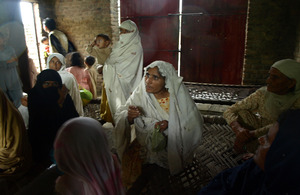DFID Research: Enhanced Learning and Research for Humanitarian Assistance: new evidence review
ELRHA is currently looking for applicants interested in undertaking a new evidence review examining how research informs decision-making in the field of public health interventions.

Safe drinking water and sanitation supplies were needed after the floods in Pakistan in 2010, Picture: Vicki Francis / UKaid / Department for International Development
Enhanced Learning and Research for Humanitarian Assistance is a collaborative network that aims to bridge the gap between higher education research and humanitarian work. ELRHA aims to develop cooperative relationships, between academics and humanitarian actors, that generate research with real measurable impact.
ELRHA is currently looking for applicants interested in undertaking a new evidence review examining how research informs decision-making in the field of public health interventions.
The review has been commissioned by DFID and the Wellcome trust and will provide a comprehensive evaluation of the existing evidence base supporting decisions on humanitarian interventions in this sector.
It comes as part of response to the UK Humanitarian Emergency Response Review (HERR) published in 2011. HERR identified certain factors which influence the decision making process in humanitarian efforts. These included the global economic downturn, security threats to humanitarian workers on the ground and a lack of coordination in the leadership management of international effort in humanitarian crises. Referring to these, the report suggested the development of a structured approach to humanitarian emergency response. One of the recommendations of this report was that DFID work to strengthen local capacity and partnerships between institutions and actors in order to build resilience.
HERR highlighted that humanitarian responses are often driven by a moral need and that more rigorous evidence and evaluation were needed in order to meet the diverse challenges.
This new evidence review aims to provide an overview of how science and research currently shape humanitarian responses specifically within the public health sector. The funding call asks that applicants consider public health in a broad sense, taking into consideration all its relevant practice areas such as water, sanitation and nutrition.
The evidence review will be aimed at two primary audiences:
- The international humanitarian community as a global public good;
- Practitioners and researchers on future DFID and Wellcome Trust commissioned projects, forming part of the anticipatory approach to disaster response outlined in the HERR.
A maximum budget of £100,000 is available for the evidence review. ELRHA are looking for multi-disciplinary research teams as well as individuals able to build a multi-disciplinary team or form part of a larger team. Applicants with strong experience in a public health approach to emergencies and an understanding of humanitarian systems will be considered.
Click here for more details and to apply. The contract will be agreed in February 2013.